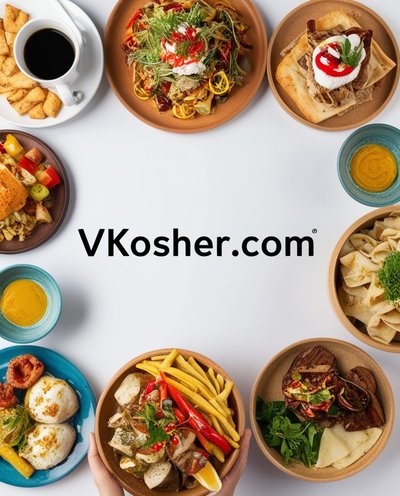Kosher Meal Kits: A Modern Approach to Tradition
In recent years, the concept of meal kits has taken the culinary world by storm. These kits, which deliver pre-measured ingredients and detailed recipes directly to consumers’ doors, offer convenience and ease in meal preparation. However, for those who adhere to kosher dietary laws, finding meal kits that align with these requirements can be a challenge. Enter kosher meal kits—an innovative solution that blends tradition with modern convenience.
Understanding Kosher Dietary Laws
To appreciate the significance of kosher meal kits, it’s essential to understand what "kosher" means. The term "kosher" originates from the Hebrew word "kashér," which means "fit" or "proper." In the context of food, kosher refers to the dietary laws derived from the Torah, the Jewish holy scriptures, and further interpreted by rabbinic authorities. These laws dictate what foods can be eaten and how they must be prepared.
One of the primary rules of kosher eating is the prohibition of mixing meat and dairy. Additionally, only certain animals are considered kosher, and they must be slaughtered in a specific manner. Fish, for example, must have fins and scales to be considered kosher, while shellfish are not allowed. Fruits and vegetables are generally kosher, but they must be inspected for bugs, which are not kosher.
The Rise of Kosher Meal Kits
The growth of the kosher meal kit market can be attributed to several factors. Firstly, the demand for kosher food has been steadily increasing, not only among Jewish communities but also among non-Jews who perceive kosher products as being cleaner or healthier. Secondly, the busy lifestyles of modern consumers have created a demand for quick, easy, and nutritious meals. Kosher meal kits address both of these needs, offering a solution that adheres to religious dietary laws while also providing convenience.
Companies that specialize in kosher meal kits have recognized the potential of this market and have tailored their offerings to meet the needs of kosher consumers. These kits typically include all the ingredients needed to prepare a meal, along with step-by-step instructions. The ingredients are pre-measured and pre-packaged, ensuring that they remain kosher throughout the preparation process.
Customization and Variety in Kosher Meal Kits
One of the most appealing aspects of kosher meal kits is the variety and customization they offer. Traditional Jewish cuisine is rich and diverse, with influences from various regions and cultures. Kosher meal kit providers often draw from this culinary heritage, offering a wide range of dishes that cater to different tastes and preferences.
For instance, a kosher meal kit might include recipes for classic dishes like matzo ball soup, gefilte fish, or challah bread, alongside more contemporary options like quinoa salad, falafel, or vegan dishes that adhere to kosher laws. This variety allows consumers to explore different aspects of kosher cuisine, whether they are looking to recreate traditional family recipes or try something new.
Additionally, many kosher meal kit providers offer customization options, allowing customers to choose meals based on dietary preferences or restrictions. For example, some kits may offer gluten-free, vegetarian, or vegan options, all prepared according to kosher standards. This flexibility ensures that kosher meal kits can cater to a wide range of dietary needs and preferences.
The Process of Ensuring Kosher Standards
Maintaining kosher standards in meal kits is no small feat. It requires careful sourcing, preparation, and packaging to ensure that the food remains kosher from farm to table. Kosher meal kit companies work closely with certified kosher suppliers to source their ingredients. These suppliers must adhere to strict guidelines regarding the production and handling of food.
Once the ingredients are sourced, they are prepared in kosher kitchens. These kitchens are typically supervised by a mashgiach, a person trained in kosher law, who ensures that the food preparation process adheres to kosher standards. This includes verifying that meat and dairy are not mixed, that utensils are used appropriately, and that all ingredients meet kosher requirements.
Packaging is another critical step in maintaining kosher standards. The packaging must be done in a way that prevents contamination, ensuring that the food remains kosher until it reaches the consumer. Many kosher meal kit companies use sealed, tamper-proof packaging to maintain the integrity of the food.
Benefits of Kosher Meal Kits
Kosher meal kits offer several benefits, particularly for those who observe kosher dietary laws. One of the most significant advantages is convenience. Preparing kosher meals from scratch can be time-consuming and challenging, especially for those who are not familiar with kosher laws. Kosher meal kits simplify this process by providing all the necessary ingredients and clear instructions, making it easier to prepare a kosher meal at home.
Another benefit is the opportunity to explore new recipes and flavors. For those who follow a kosher diet, meal planning can sometimes feel restrictive. Kosher meal kits offer a way to diversify one’s diet by introducing new and exciting recipes that adhere to kosher laws. This can be especially appealing to younger generations who may be looking to connect with their cultural heritage in a modern way.
Kosher meal kits also provide peace of mind. Knowing that the ingredients and preparation methods meet kosher standards can alleviate the stress and uncertainty that sometimes comes with trying to maintain a kosher diet. This is particularly important for those who live in areas where kosher food is not readily available.
The Impact of Kosher Meal Kits on Jewish Communities
Kosher meal kits have had a positive impact on Jewish communities, particularly in areas where access to kosher food is limited. These kits have made it easier for people to maintain their kosher lifestyle, even if they do not live near a kosher grocery store or restaurant.
Moreover, kosher meal kits have helped to strengthen cultural and religious connections within Jewish communities. For many, preparing and sharing food is an essential part of Jewish life. Kosher meal kits have made it easier for individuals and families to participate in this tradition, whether they are preparing a meal for Shabbat, a holiday, or a regular weeknight dinner.
Additionally, kosher meal kits have played a role in educating the broader public about kosher dietary laws and Jewish culinary traditions. As more people become interested in these kits, there is a growing awareness and appreciation of kosher food and culture.
Challenges and Considerations in the Kosher Meal Kit Industry
While kosher meal kits offer many benefits, there are also challenges associated with this industry. One of the primary challenges is cost. Sourcing kosher ingredients and maintaining kosher kitchens can be more expensive than standard food production methods. As a result, kosher meal kits can be more costly than non-kosher alternatives.
Another challenge is ensuring that the meal kits meet the diverse needs of kosher consumers. Jewish dietary laws vary among different communities, and what is considered kosher in one community may not be acceptable in another. Kosher meal kit companies must navigate these differences and offer products that are acceptable to a wide range of consumers.
Logistics and distribution also present challenges. Kosher meal kits must be delivered in a way that maintains the integrity of the food, which can be difficult when shipping perishable items. Companies must invest in reliable packaging and delivery methods to ensure that their products arrive fresh and kosher.
The Future of Kosher Meal Kits
The future of kosher meal kits looks promising as more consumers embrace this convenient way of maintaining their kosher diet. With the continued growth of the meal kit industry and increasing demand for kosher products, it is likely that we will see more innovation and variety in kosher meal kits.
One potential area of growth is in the expansion of kosher meal kit offerings to include more international and fusion cuisine. As the world becomes more interconnected, there is a growing interest in exploring different culinary traditions. Kosher meal kits could tap into this trend by offering recipes that combine traditional Jewish dishes with flavors and ingredients from other cultures.
Another area of potential growth is in the use of technology to enhance the kosher meal kit experience. For example, some companies are exploring the use of apps or online platforms to provide customers with additional resources, such as cooking tutorials, meal planning tips, and information about kosher dietary laws. These digital tools could help consumers get the most out of their kosher meal kits and make the cooking process even more enjoyable.
Sustainability is also likely to become a more significant focus for kosher meal kit companies. As consumers become more conscious of their environmental impact, there is a growing demand for eco-friendly products. Kosher meal kit companies could respond to this demand by using sustainable packaging, sourcing ingredients from local or organic farms, and offering plant-based meal options.
Conclusion: A Harmonious Blend of Tradition and Modernity
Kosher meal kits represent a harmonious blend of tradition and modernity, offering a convenient way for people to maintain their kosher diet while exploring new and exciting recipes. These kits have made it easier for individuals and families to connect with their cultural and religious heritage, even in the midst of busy, modern lives.
As the kosher meal kit industry continues to grow and evolve, it has the potential to make a lasting impact on Jewish communities and the broader culinary world. By offering a solution that respects tradition while embracing innovation, kosher meal kits are helping to shape the future of kosher dining.
In recent years, the concept of meal kits has taken the culinary world by storm. These kits, which deliver pre-measured ingredients and detailed recipes directly to consumers’ doors, offer convenience and ease in meal preparation. However, for those who adhere to kosher dietary laws, finding meal kits that align with these requirements can be a challenge. Enter kosher meal kits—an innovative solution that blends tradition with modern convenience.
Understanding Kosher Dietary Laws
To appreciate the significance of kosher meal kits, it’s essential to understand what "kosher" means. The term "kosher" originates from the Hebrew word "kashér," which means "fit" or "proper." In the context of food, kosher refers to the dietary laws derived from the Torah, the Jewish holy scriptures, and further interpreted by rabbinic authorities. These laws dictate what foods can be eaten and how they must be prepared.
One of the primary rules of kosher eating is the prohibition of mixing meat and dairy. Additionally, only certain animals are considered kosher, and they must be slaughtered in a specific manner. Fish, for example, must have fins and scales to be considered kosher, while shellfish are not allowed. Fruits and vegetables are generally kosher, but they must be inspected for bugs, which are not kosher.
The Rise of Kosher Meal Kits
The growth of the kosher meal kit market can be attributed to several factors. Firstly, the demand for kosher food has been steadily increasing, not only among Jewish communities but also among non-Jews who perceive kosher products as being cleaner or healthier. Secondly, the busy lifestyles of modern consumers have created a demand for quick, easy, and nutritious meals. Kosher meal kits address both of these needs, offering a solution that adheres to religious dietary laws while also providing convenience.
Companies that specialize in kosher meal kits have recognized the potential of this market and have tailored their offerings to meet the needs of kosher consumers. These kits typically include all the ingredients needed to prepare a meal, along with step-by-step instructions. The ingredients are pre-measured and pre-packaged, ensuring that they remain kosher throughout the preparation process.
Customization and Variety in Kosher Meal Kits
One of the most appealing aspects of kosher meal kits is the variety and customization they offer. Traditional Jewish cuisine is rich and diverse, with influences from various regions and cultures. Kosher meal kit providers often draw from this culinary heritage, offering a wide range of dishes that cater to different tastes and preferences.
For instance, a kosher meal kit might include recipes for classic dishes like matzo ball soup, gefilte fish, or challah bread, alongside more contemporary options like quinoa salad, falafel, or vegan dishes that adhere to kosher laws. This variety allows consumers to explore different aspects of kosher cuisine, whether they are looking to recreate traditional family recipes or try something new.
Additionally, many kosher meal kit providers offer customization options, allowing customers to choose meals based on dietary preferences or restrictions. For example, some kits may offer gluten-free, vegetarian, or vegan options, all prepared according to kosher standards. This flexibility ensures that kosher meal kits can cater to a wide range of dietary needs and preferences.
The Process of Ensuring Kosher Standards
Maintaining kosher standards in meal kits is no small feat. It requires careful sourcing, preparation, and packaging to ensure that the food remains kosher from farm to table. Kosher meal kit companies work closely with certified kosher suppliers to source their ingredients. These suppliers must adhere to strict guidelines regarding the production and handling of food.
Once the ingredients are sourced, they are prepared in kosher kitchens. These kitchens are typically supervised by a mashgiach, a person trained in kosher law, who ensures that the food preparation process adheres to kosher standards. This includes verifying that meat and dairy are not mixed, that utensils are used appropriately, and that all ingredients meet kosher requirements.
Packaging is another critical step in maintaining kosher standards. The packaging must be done in a way that prevents contamination, ensuring that the food remains kosher until it reaches the consumer. Many kosher meal kit companies use sealed, tamper-proof packaging to maintain the integrity of the food.
Benefits of Kosher Meal Kits
Kosher meal kits offer several benefits, particularly for those who observe kosher dietary laws. One of the most significant advantages is convenience. Preparing kosher meals from scratch can be time-consuming and challenging, especially for those who are not familiar with kosher laws. Kosher meal kits simplify this process by providing all the necessary ingredients and clear instructions, making it easier to prepare a kosher meal at home.
Another benefit is the opportunity to explore new recipes and flavors. For those who follow a kosher diet, meal planning can sometimes feel restrictive. Kosher meal kits offer a way to diversify one’s diet by introducing new and exciting recipes that adhere to kosher laws. This can be especially appealing to younger generations who may be looking to connect with their cultural heritage in a modern way.
Kosher meal kits also provide peace of mind. Knowing that the ingredients and preparation methods meet kosher standards can alleviate the stress and uncertainty that sometimes comes with trying to maintain a kosher diet. This is particularly important for those who live in areas where kosher food is not readily available.
The Impact of Kosher Meal Kits on Jewish Communities
Kosher meal kits have had a positive impact on Jewish communities, particularly in areas where access to kosher food is limited. These kits have made it easier for people to maintain their kosher lifestyle, even if they do not live near a kosher grocery store or restaurant.
Moreover, kosher meal kits have helped to strengthen cultural and religious connections within Jewish communities. For many, preparing and sharing food is an essential part of Jewish life. Kosher meal kits have made it easier for individuals and families to participate in this tradition, whether they are preparing a meal for Shabbat, a holiday, or a regular weeknight dinner.
Additionally, kosher meal kits have played a role in educating the broader public about kosher dietary laws and Jewish culinary traditions. As more people become interested in these kits, there is a growing awareness and appreciation of kosher food and culture.
Challenges and Considerations in the Kosher Meal Kit Industry
While kosher meal kits offer many benefits, there are also challenges associated with this industry. One of the primary challenges is cost. Sourcing kosher ingredients and maintaining kosher kitchens can be more expensive than standard food production methods. As a result, kosher meal kits can be more costly than non-kosher alternatives.
Another challenge is ensuring that the meal kits meet the diverse needs of kosher consumers. Jewish dietary laws vary among different communities, and what is considered kosher in one community may not be acceptable in another. Kosher meal kit companies must navigate these differences and offer products that are acceptable to a wide range of consumers.
Logistics and distribution also present challenges. Kosher meal kits must be delivered in a way that maintains the integrity of the food, which can be difficult when shipping perishable items. Companies must invest in reliable packaging and delivery methods to ensure that their products arrive fresh and kosher.
The Future of Kosher Meal Kits
The future of kosher meal kits looks promising as more consumers embrace this convenient way of maintaining their kosher diet. With the continued growth of the meal kit industry and increasing demand for kosher products, it is likely that we will see more innovation and variety in kosher meal kits.
One potential area of growth is in the expansion of kosher meal kit offerings to include more international and fusion cuisine. As the world becomes more interconnected, there is a growing interest in exploring different culinary traditions. Kosher meal kits could tap into this trend by offering recipes that combine traditional Jewish dishes with flavors and ingredients from other cultures.
Another area of potential growth is in the use of technology to enhance the kosher meal kit experience. For example, some companies are exploring the use of apps or online platforms to provide customers with additional resources, such as cooking tutorials, meal planning tips, and information about kosher dietary laws. These digital tools could help consumers get the most out of their kosher meal kits and make the cooking process even more enjoyable.
Sustainability is also likely to become a more significant focus for kosher meal kit companies. As consumers become more conscious of their environmental impact, there is a growing demand for eco-friendly products. Kosher meal kit companies could respond to this demand by using sustainable packaging, sourcing ingredients from local or organic farms, and offering plant-based meal options.
Conclusion: A Harmonious Blend of Tradition and Modernity
Kosher meal kits represent a harmonious blend of tradition and modernity, offering a convenient way for people to maintain their kosher diet while exploring new and exciting recipes. These kits have made it easier for individuals and families to connect with their cultural and religious heritage, even in the midst of busy, modern lives.
As the kosher meal kit industry continues to grow and evolve, it has the potential to make a lasting impact on Jewish communities and the broader culinary world. By offering a solution that respects tradition while embracing innovation, kosher meal kits are helping to shape the future of kosher dining.




